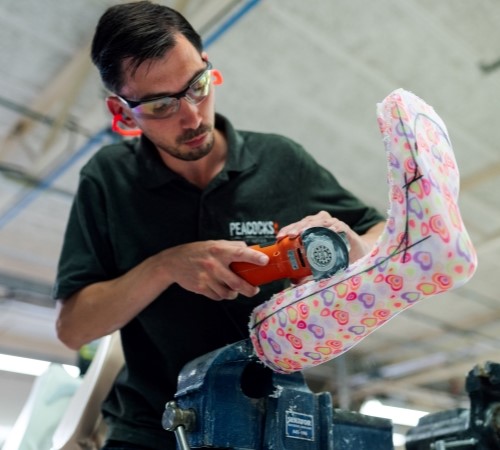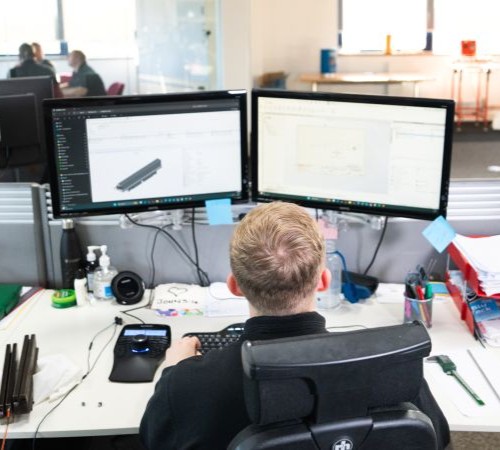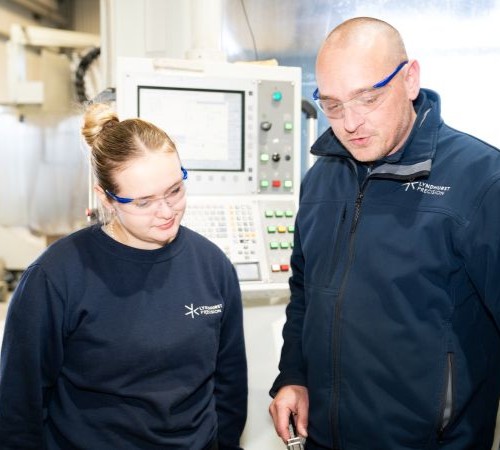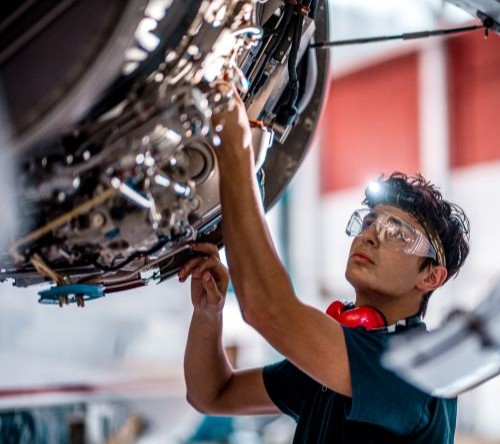What is an industry placement?
Every T Level learner is required to complete an industry placement of a minimum of 45 days (315 hours) with an employer. Industry placements provide a valuable opportunity for learners to develop practical and technical skills and make a meaningful contribution to an organisation.
Industry placements are longer than typical work experience placements and must be well planned and clearly structured to ensure that the learner has appropriate opportunities to learn and apply pre-defined knowledge, skills, and behaviours as well as add value to the host employer. Industry placements must be completed with an employer in an industry relevant to a student’s T Level study programme.

The six stages of an industry placement
We have broken down the industry placement process into six steps:
- Finding a provider. Every employer interested in providing a placement will need to work with an education provider such as a school or college.
- Planning for an industry placement. Work with the education provider to determine the key details of the placement.
- Preparing for the placement. Ensure that any legal obligations and requirements are met.
- Choosing your placement student. Determine selection criteria and choose T level student(s).
- During the placement. Managing the student whilst they are on placement, providing feedback and maximising the student experience.
- After the placement. Placement review and deciding on any appropriate next steps.
Find a provider
Search for T Level providers near you to discuss your business, their students and how their learning can benefit your organisation.
Contacting a T level provider is the first step in engaging in the process. These providers can be schools or colleges which are offering the relevant T level course. You don't need to have planned out all of the details of the placement you wish to offer before contacting a supplier.
Making contact with a T Level provider from the outset will help in your decision-making and allow time for the right conversations to take place.
Many colleges run employer engagement initiatives to develop partnerships with businesses in their area and will welcome approaches from any new employers wishing to offer industry placements or work experience.

Planning for an industry placement

Employers are welcomed and encouraged to work in partnership with T Level providers. Throughout the whole process of designing the structure of the placement, selecting the most suitable candidate for your business and gaining the most from the opportunity.
Some examples of what to agree with your educational provider:
- Agree dates and times that work best for everyone.
- Discuss how often the student will attend.
- Plan the projects and tasks the student will do whilst on placement.
The provider will assist you with understanding and taking all the steps necessary to accomplish a successful industry placement.
- Engage with your provider to agree the details of the placement.
- Define the timings and duration of work placements.
- Seek guidance or collaboration from the provider on any necessary documentation to support the industry placement.
- Consider any reasonable adjustments that might be necessary for accommodating the placement and/or student.
- Clearly define the role on offer that will be undertaken by the placement student and detail any skills that they will acquire. You can define and plan the content of your placement using this table available for download. Discuss any specific requirements and/or prior knowledge that you would expect before the placement can begin.
- Understand the goals and objectives of the T Level placement from the provider perspective. View some examples of projects you can set for your industry placement students and tips for planning them. Assist your provider with industry perspectives necessary to produce documentation detailing the learning opportunities for the placement. This documentation is a tailored record of your placement mapped to study aims of the T Level. View some example templates for industrial placement objectives.
- Consider the health, safety and well-being needs for the placement student. What kinds of induction training and continued supervision will they need whilst they are on placement? See more in step 3.
- Identify appropriate supervision for students, with capacity to hold regular meetings and provide feedback in support of the placement.
Download a document with examples of industry placements which will be useful in planning and agreeing the placement with the educational provider.
Preparing for an industry placement
When the detailed planning of the placement itself is complete or nearing completion, your T Level provider will also support you on aspects of legal compliance which may include some or all the following:
Health and safety
Employers are responsible for the health and safety of students while they are on an industry placement. You must provide a safe working environment, adequate induction, and suitable training.
Health & Safety for placement students
Risk assessment
You should always complete a risk assessment before a student starts on placement. This is particularly important if you work in a high-risk sector.
Insurance
You will need to ensure that appropriate Employer’s Liability Insurance and Public Liability Insurance is in place for the presence of and work undertaken by the placement student.
Safeguarding
Schools and colleges are responsible for the safeguarding and welfare of students on industry placements – but they need your cooperation.
The Prevent initiative
Schools and colleges have a legal duty to take steps to prevent students being drawn into terrorism and reduce the possibility of radicalisation. This is done through the Prevent initiative. They are responsible for doing this during placements – and they need you to cooperate.
Equality
Employers and T Level providers must comply with their obligations under the Equality Act 2010
Data access and security
Your normal data and cyber-security policies and procedures will apply to industry placement students. Your organisation is responsible for complying with data protection legislation if it handles personal data, including any students that
may handle data on a placement.
For further information, please go to the GOV.UK website regarding legal compliance for industry placements .
Choosing your placement student
Like finding the right person for a full-time working role, you’ll want to find the right placement student for you. The provider will evaluate the suitability of their students to be a good fit for the interests and aims of your business based on what you tell them.
Be prepared to tell the school or college about your organisation and the nature of your business, what roles and responsibilities you can offer a placement student and the sort of person you need.
The school or college provider will find suitable students and then you can choose the right person(s) for your business.
Selection process
1. Write a placement role description.
Describe your organisation, the student’s role and responsibilities and the kind of person you’re looking for as an industry placement student.

2. Assess student applications.
As with any application to join your organisation you may wish to consider each application prior to taking it any further.
3. Interview the student applicants (most likely with the provider).
You are providing a great opportunity for young people to test their CV, application, and interview skills. Some young people will not have had expert help to prepare and may have some anxiety about taking an industry placement. Consider what you can do to help them feel relaxed and confident so they can show you their best selves during the recruitment process.
4. Communicate your decision to the provider.
Having made your decision and selection of any suitable candidates for your placement, you should allow some time for the student to confirm to you or via the provider that they would like to proceed with your offer.
During the placement
Bringing a T Level industry placement student into the business is your opportunity to target the areas of your organisation that will benefit most from new resources. A successful industry placement experience has the potential to transform a temporary part-time student into a well-motivated and engaged full-time member of staff with essential skills and experience within your business.
Assign an employee mentor to guide student progress towards their objectives, the provider will always be on hand to help with any questions or issues you have. The time invested in supporting the industry placement student by individuals within your organisation can also serve to provide enrichment within their working roles and contribute to higher productivity within the workforce.
Factors to consider during the industry placement.
On the first day:
- Explain the main business activity and the expectations of the industry placement.
- Conduct a health and safety induction.
- The induction checklist will help with suggestions of what you might cover and consider during your day one student induction.
Provide those supervising the student with a platform to record their observations of the student, identifying their strengths and weaknesses.
Where possible during the placement, provide opportunities for the student to undertake an activity that produce something they can take away with them, for example an information flow or the manufacture/ assembly of a token product.
Provide feedback to the educational establishment of any issues during the work placement, usually though the observations and comments from their mentor and those that have been involved in supervising them.
Maintain records of the student in terms of attendance and any training or instruction that has been given.
Encourage and support the student in completing a logbook of the work activities they have performed during their work placement.
After the placement
Would you consider offering the placement student a permanent position or a progression route within your organisation?
At the end of a placement, conduct a review of the student’s achievements and the outcomes from their time in the business.
You can also offer valuable feedback on their level of commitment and motivation, how they adapt to new situations, and what their strengths are. You could offer advice on where they might develop their skills to achieve their career ambitions.
At the end of the placement:
Use the following template for your student review: End of placement review (student)
Your provider may wish to conduct a review with you: End of placement review (provider)
Consider the options of bringing a young person into your workplace: T level graduate options

Additional useful links
There is lots of information available about T levels. Use the below links to guide your involvement and ensure a successful placement and experience.
- Additional advise from the government about the industry placement process and how the educational provider can support employers.
- Download a document with examples of how a provider and employer can work together to deliver different kinds of industry placements.
- You can be sure that final preparations are complete, and everything is ready on the first day with: this practical checklist.
Explore employer experiences
We have a bank of case studies from employers across the engineering sector detailing their experiences working with T levels students on placement. Watch the video below or visit our case studies section for more information.
Video transcript: Lucy's placement with Lyndhurst
[Music] Lyndhurst as a business is a engineering company we do our own design work in house and then we'll do the development prototyping of various tooling or special purpose Machinery it can be for food industry Automotive nuclear varied inv vast we always found it was hard to find good apprentices there's an industry shortage of young people come through the industry so bringing T- Level students in is trying to fill that Gap in the [Music] market it wasn't something I knew about actually tea levels it was introduced to us by going on school visits College visits supporting open days from that we started getting requests to host them for tea levels we've currently got three students with us now we've had them fabricating we've had them working CNC machines and programming they're not making fictitious jobs up for them you know they're actually here helping the business the students com to Linda's Precision already with some knowledge about engineering we're not starting from scratch they've been taught stuff at college and they could each time they come what I like to see is how excited they are to come so much so they ask can we come in the holidays could we do an extra day and if they want to come in and do more and learn more give them the opportunity you know that's all I can say the place m is really important for having hands-on experience in a workplace I find it very interesting designing new parts and new technologies for engineering because it's the future they come with a syllabus basic syllabus of things they want to hopefully cover depending on what skill sets you've got within the business you you use it to your best ability get the students involved let them develop and work with your team as a day-to-day business don't change the business keep the business the same and they will fit in with you we'll be doing it again and we'll continue doing that it has been a success it's a success story [Music]
